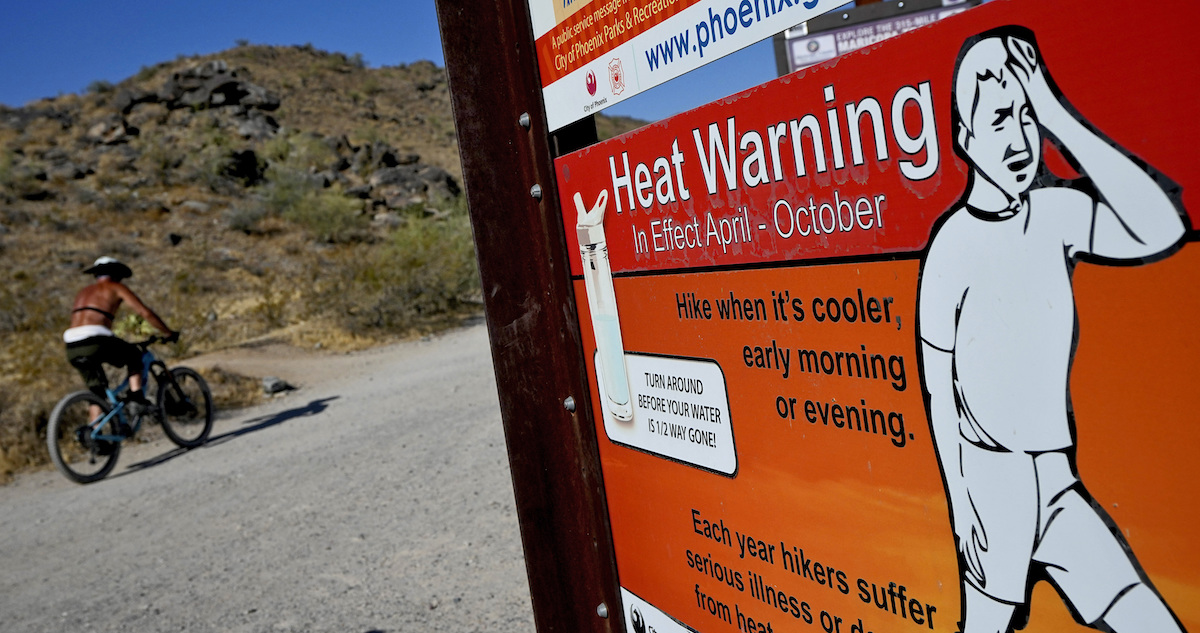

Our only agenda is to publish the truth so you can be an informed participant in democracy.
We need your help.


A digital billboard displays an unofficial temperature, July 17, 2023, in Phoenix. Cities across the United States and around the world are grappling with ways to protect people from extreme heat as global temperatures rise each year. (AP)
Fox News Host Jesse Watters said the National Oceanic and Atmospheric Administration’s temperature data is flawed in a way that overstates rising global temperatures. It appears he based the claim on a misunderstanding of the "urban heat island effect" and a 2022 report’s erroneous conclusion.
Climate scientists know data collection site conditions can affect temperature data, and experts said they use algorithms to adjust the data accordingly.
Independent groups that track temperature data around the world all report that annual global average temperatures are rising.
Learn more about PolitiFact’s fact-checking process and rating system.
Fox News host Jesse Watters recycled a claim climate change deniers have been making for years.
"Hottest year on record, huh?" Watters asked Jan. 31 on "Jesse Watters Primetime," his skepticism apparent. He expressed doubts about the longevity and accuracy of global temperature records, then criticized the legitimacy of National Oceanic and Atmospheric Administration’s temperature data collection.
NOAA, the federal agency that studies weather, oceans and the climate, is "putting the thermometers in the cities … on concrete and asphalt," Watters said.
"You ever been to the city in the summer?" he asked. "You ever walk around in your bare feet on a city sidewalk in August? It’s hot. That’s where we’re putting the thermometers to measure the world’s temperature. On little heat islands."
Concrete and asphalt attracts and retains heat more than countryside landscapes, Watters said. "It can be 10 degrees hotter in the city than the country on the same day."
"The government’s been placing thermometers to measure global warming on airport runways," he said, adding that others were found in parking lots, rooftops and "in exhaust fans of (air conditioning) units."
"No wonder we think the Earth’s warming," Watters said. "We’re literally cooking the books."
(Internet Archive)
That claim is misleading: Climate scientists know a weather station’s site conditions can affect temperature data, and therefore use algorithms to adjust the data accordingly, experts say. Also, climate change analysis focuses on trends over time, and independent groups that track temperature data around the world all report that annual global average temperatures are rising.
During the segment, Watters shared a Jan. 29 X post that said, "Documents clearly show that 96% of U.S. temperature reporting stations are improperly located" in places that produce "unrealistic warming" because of heat islands. That refers to the effect of urban infrastructure such as roads and bridges retaining and re-emitting the sun’s heat, causing higher temperatures than in more natural landscapes.
Watters didn’t show it in the broadcast, but the post linked to a 2022 blog post titled "96% of U.S. climate data is corrupted" about a report by the Heartland Institute, a conservative think tank. Climate experts criticized the report, which was written by someone climate scientists called a "well-known climate denialist." In 2022, we rated that 96% climate data claim False.
The 2022 Heartland Institute’s report analyzed 128 temperature stations out of several thousand volunteer-run stations and found that 96% of them failed to meet NOAA’s placement recommendations. Experts said the report then incorrectly extrapolated that data to falsely claim that improper station placement undermined long-term climate change trends.
Many of Watters’ claims — such as the idea that thermometers used to measure global temperatures are in asphalt parking lots, at airports or near air conditioners — echoed details in the Heartland Institute’s report.
We also contacted Fox News, and a Watters spokesperson provided a link to an EPA site on the "Heat Island Effect."
"Daytime temperatures in urban areas are about 1–7°F(ahrenheit) higher than temperatures in outlying areas and nighttime temperatures are about 2-5°F higher," read the passage the spokesperson identified.
Kristina Dahl, the principal climate scientist for the Union of Concerned Scientists’ Climate & Energy program, cautioned against using the urban heat island effect to explain the documented rise in global temperatures.
"It might be easier to make urbanization the villain here or to try to pin the temperature trends observed at stations around the globe on urbanization alone," she said. But "comparing temperature trends from urban vs. rural weather stations shows that warming is happening in both types of environments."
Scientists who track climate data account for the urban heat island effect when evaluating temperature changes, NASA said on its website.
NOAA data shows that temperatures have warmed by about 1.8 degrees Fahrenheit since the agency began tracking climate data in 1850, Dahl said.
"Other climate agencies in the U.S. and around the world show the same thing," Dahl said. "All of those agencies also found that 2023 was the hottest year on record."

A cyclist finishes his ride early to beat high temperatures, Monday, July 10, 2023, in Phoenix. National Weather Service says Phoenix has had 10 consecutive days of 110 degrees or above. (AP)
Dahl said there’s no merit to Watters’ claim that NOAA is rigging data to ensure it shows rising temperatures.
"Both NOAA and NASA rely on data from a global network that includes thousands of weather stations as well (as) water temperature measurements from ships and buoys in the ocean," she said. Those stations are in a variety of places. "When I look at stations within the San Francisco Bay Area, for example, there are some in dense urban areas, some in city parks, some in coastal mountain ranges, and some in small towns."
Robert Rohde, the lead scientist at Berkeley Earth, a California-based organization providing global temperature data, told PolitiFact in 2022 that NOAA and the National Weather Service have two programs to monitor U.S. weather conditions. The volunteer-run program, which was the Heartland Institute’s study’s exclusive focus, has less rigorous standards for where temperature stations can be installed. The other program has more sophisticated, automated weather stations and more stringent location requirements.
Temperature stations for global temperature analyses are "from a blend of urban and rural locations" and meet requirements for equipment and location standards, said Karin Gleason, monitoring section chief from NOAA’s National Centers for Environmental Information.
"Homogeneity algorithms are applied to the data collected so that they can be compared with stations from around the world on more equal footing," she said. "This allows for an apples-to-apples comparison, removing bias from artificial environments."
Dahl said she has no concerns about potential bias in NOAA’s temperature station locations. If NOAA’s data were biased, she said it’s unlikely its findings "would consistently be reproduced by other climatological organizations around the world that use different methodologies to deduce global temperature trends."
Watters claimed that "we think the Earth’s warming" because "we’re literally cooking the books" with NOAA’s flawed global temperature data.
His claim was based on a misunderstanding of the urban heat island effect and a 2022 report that falsely concluded 96% of U.S. climate data is corrupted. Climate scientists know a weather station’s site conditions can affect temperature data, and therefore adjust the data accordingly, experts say.
Climate change analysis focuses on change over time, and independent groups that track temperature data around the world all report that annual global average temperatures are rising.
We rate this claim False.
RELATED: Fact-checking a talking point about ‘corrupted’ climate change data
Email interview with Kristina Dahl, principal climate scientist for the climate and energy program at the Union of Concerned Scientists, Feb. 6, 2024
Email interview with Karin Gleason, monitoring section chief from NOAA’s National Centers for Environmental Information, Feb. 7, 2024
Email response from Fox News spokesperson, Feb. 6, 2024
"Jesse Watters Primetime" Fox News Jan. 31, 2024, episode, archived Jan. 31, 2024
John Shewchuk, X post, Jan. 29, 2024
Climate Feedback, NOAA does not fraudulently adjust data to create the illusion of a global warming trend, March 29, 2018
The Heartland Institute, Media advisory: 96% of U.S. climate data Is corrupted, July 27, 2022
Berkeley Earth, Understanding adjustments to temperature data, April 21, 2015
Enterprise Record, Letter: Weather stations fail to meet standards Aug. 5, 2022
Heartland Institute, 2022 Edition - Corrupted Climate Stations, Aug. 2022
NOAA Climate Services, Talking points related to: ‘Is the U.S. Temperature Record Reliable’? June 9, 2009
Advancing Earth and Space Science, On the reliability of the U.S. surface temperature record, June 8, 2010
The Guardian, No climate conspiracy: NOAA temperature adjustments bring data closer to pristine, Feb. 8, 2016
Climate Feedback, NOAA does not fraudulently adjust data to create the illusion of a global warming trend, Feb. 19, 2020
American Meteorological Society, Improved historical temperature and precipitation time series for U.S. climate divisions, May 1, 2014
National Centers for Environmental Information, February 2014 National Climate Report, accessed Feb. 5, 2024
Media Matters for America, Fox News’ Jesse Watters cites debunked claim to argue that climate scientists fabricated US temperature data, Feb. 1, 2024
Heartland Institute, Corrupted climate stations, the official U.S. temperature record remains fatally flawed, 2022 edition
NASA Earth Observatory, "World of change: global temperatures," accessed Feb. 7, 2024
National Oceanic and Atmospheric Administration, 2023 was the world’s warmest year on record, by far, Jan. 12, 2024
Skeptical Science, Does Urban Heat Island effect exaggerate global warming trends? July 5, 2015
Copernicus Climate Change Service, Copernicus: 2023 is the hottest year on record, with global temperatures close to the 1.5°C limit, Jan. 9, 2024
NASA, NASA Analysis confirms 2023 as warmest year on record, Jan. 12, 2024
NOAA, Climate change: global temperature, Jan. 18, 2024
Berkeley Earth, Press release: 2023 was warmest year since 1850, Jan. 12, 2024
NASA, Can you explain the urban heat island effect?, accessed Feb. 7, 2024
Environmental Protection Agency, Learn about heat islands, accessed Feb. 7, 2024
In a world of wild talk and fake news, help us stand up for the facts.
